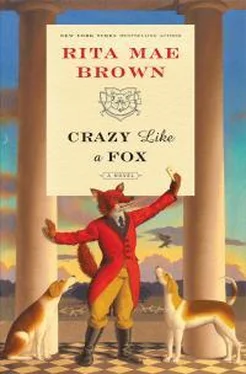No amount of money can buy your way out of some types of wrongdoing.
“It is Monday. I expect papers delivered to your office on Tuesday, clarifying that I will receive half of all future earnings of Harris and Harris. I expect half of all cash accounts and stocks and bonds by the end of Tuesday’s business day, central time. In exchange I will give you all footage, and I will switch all my credit cards to my name alone after October 10. If he does not comply, we go to Round Two.”
“It will be done.”
She hung up, leaned back in the office chair. Two days of rain had not dampened her spirits. If anything, she felt fabulous.
She had returned from another riding lesson, held in Crawford’s indoor arena due to all the mud. The arena, climate controlled, full of light, blended in with the other structures. The cost was $350,000 when he built it, but Crawford had the money. Marty, a garden designer, cared how things looked, hence the pleasing exterior and landscaping.
The only oddity that Yvonne noticed was a bit of sound bouncing around, for it was cavernous. Sam, on the ground, told her exactly what to do. She trotted for a few minutes.
After her lesson—she paid cash each time—she drove back to Beveridge Hundred filled with confidence.
The last two days, as she drove toward Chapel Cross, she could see men working despite the rain.
Today, coming back from Beasley Hall, they were still at it. She found herself drawn to the progress at Old Paradise, to this part of the county.
After her lesson and the invigorating phone call, she determined to find a used SUV, not horrible on gas, for Tootie, before that Toyota died a well-deserved death.
CHAPTER 21
In the distance, the slap slap slap of the huge waterwheel could be heard. Saturday, October 7, Sister did as Gray suggested, moved the cast time to eight A.M. Given that Thursday had been canceled due to the torrential rains of Tuesday and Wednesday, a large field assembled.
Wind after the rains helped dry out the soil just enough so the footing was springy, slick in spots. Rickyroo, Sister’s Thoroughbred mount, at thirteen, loved the footing, loved foxhunting, loved Sister. What he didn’t love was other horses pushing his behind. Wolsey, turned out with Rickyroo, actually didn’t push him but unkind words were spoken. Irritated the hell out of the Master’s horse. He was first, not even first among equals, but first. He didn’t need any lip about his hindquarters.
Shaker’s horse for the day, Kilowatt, would not have lowered himself to chat with a peon in the field. Betty Franklin’s Outlaw, a friendly Quarter Horse, would flick his ears and swish his tail when he passed the field, but he usually had something pleasant to say. Kasmir Barbhaiya’s Jujube, ridden by Tootie at the request for some seasoning, paid not the least bit of attention to the fifty-two horses and riders. All his senses focused on this new task at hand.
Kasmir on Nighthawk rode with Alida on Lucille Ball, so named for her flaming chestnut coat.
Many a horseman or houndsman would counsel newcomers to foxhunting not to name a horse something like Devil’s Boy, nor a hound Viagra. The wisdom was that the animal would live up or down to his or her name. Hounds and horses understand language. This old wives’ tale, as many newcomers thought of it, proved to be true more often than not. And thanks to studies at a Hungarian university, as well as at American ones, it was becoming evident to those needing scientific proof that yes, animals did understand language—at least higher vertebrates did. And they learned it like humans: left brain for logic, right brain for emotion and creativity.
Had anyone known that, witnessing Lucille Ball cut a caper would have made them laugh. Too late to change the redhead’s name now. Once a run commenced, Lucille would settle down. Until then there was prancing, snorting, sideways trotting, casting her eye backward to let Alida know she saw everything, absolutely everything, including the fact that Alida carried her crop sideways so Lucille knew it was in her hands. Lucille could have cared less. She knew her 1200 pounds pitted against Alida’s 135 meant she would win. Alida put up with it because Lucille could jump the moon, had gaits smooth as silk, and was bold, wondrously bold. You put her to anything, you were going over.
A guest, Marilyn Davidson, told Alida to take Lucille to the back of the field. Alida, too much of a lady, squelched the retort, which would have been, “Why don’t you learn how to ride? Then you wouldn’t mind my horse.” All she did was turn her head to reply, “Once we’re going she’s an angel.”
No sooner was this out of her mouth than bam, they were going.
Mill Ruins sat four miles north of Chapel Cross. The soil was not as rich as that at Chapel Cross; the lay of the land was similar, good flat pastures that, heading west, quickly turned into ravines with thick woods. Mill Ruins took advantage of the faster running waters of the feeder creek, wide, to the Tye River miles and miles away, which poured into the James at Buffalo Station. That fast-moving water provided the energy for the mill’s waterwheel. The original settler back in 1752 knew what he was doing. The waterwheel still turned. A miller could grind grain, if one could be found.
Hounds struck to the right of Walter’s house. Sister took a little feel of Rickyroo’s reins, for the pastures were extensive and with a slight roll. They were perfect for galloping, as was the footing.
Staff smiled broadly because a youngster had found the line and had been honored by the pack for the first time. Audrey, nose to the ground, knew she’d joined the big kids. Her littermates, not quite two years old, Aero, Angle, and Ace, desperately wanted to prove themselves. Young, fast, they bunched up right behind their sister. Dasher flew by them. He was called Dasher for a reason. His littermate, Diana, joined him. Pride of place belonged to them and, in their prime, they had plenty of gas in the engine.
Pride of place in the hunt field belonged to the Bancrofts, in their eighties still riding First Flight. Gray fell back to allow them to move up behind Sister. An hour of hard running didn’t faze them. By the second hour they would wind up in the middle of the field.
At this moment, no one was too concerned with their place in the field, because the entire pack shot across the newly mown pasture, jumped over a tiger-trap jump, and headed north into another pasture, large hay bales dotted about like shredded wheat.
Tinsel stopped a moment to check out a hay bale. Yes, the fox had been there but was now gone, so Tinsel needed to catch up.
After twenty minutes of sublime music, hard running, hounds threw up at the junction of Miller’s Creek with Tidy’s Corner. No one ever knew how Tidy received the name. Off of Miller’s Creek, the mill run ran like an arrow back to the mill. Tidy’s creek’s lesser force added to the sometimes turbulent Miller’s Creek. The mill run smoothed out the water to the wheel, but baffles existed along its mile-long route, where water could be slowed if necessary. Too much force could harm the gears in the wheel. If the paddles broke, that was an easy fix. If the gears were damaged to the wheel or the grindstones, that caused big problems. Those former millers thought of everything.
So did the fox. He dabbled at the corner, zigzagging between both creeks. Hounds found tidbits of scent but nothing held. Given that they were American hounds, their work ethic was sensational. The devotees of the three other types of foxhounds would praise their hounds, too: Crossbreds, English, Pennmarydel. But American hounds have ever been prized for their drive. What could be lacking sometimes was biddability, listening. That’s why Sister, Shaker, Betty, and Tootie played with them once they were six weeks old, and walked hounds throughout the year for the rest of their lives. You want them to listen. Even more, you want them to want to listen.
Читать дальше












